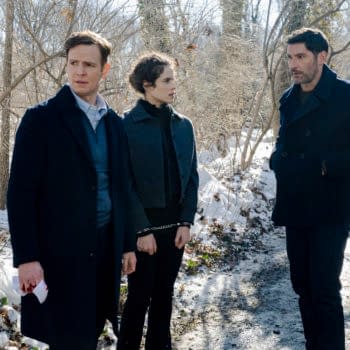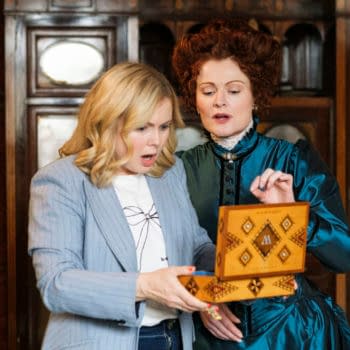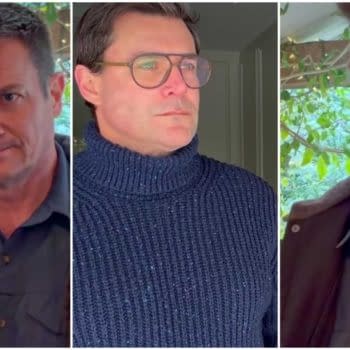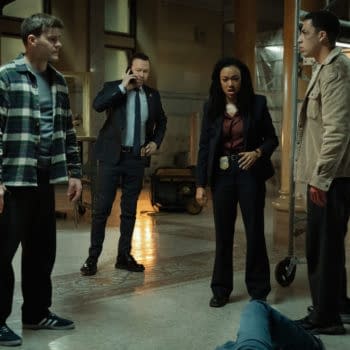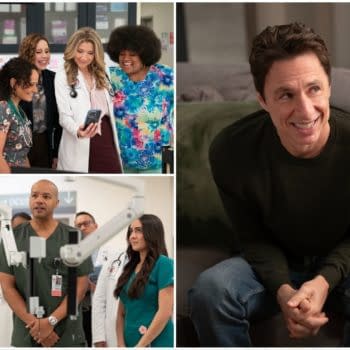Posted in: Paramount+, streaming, TV | Tagged: amptp, SAG-AFTRA, star trek, The Next Generation, the ready room, wga, wil wheaton
Star Trek Residuals "Kept Me Afloat For Two Decades": Wil Wheaton
Speaking on behalf of the SAG-AFTRA & WGA strikes, Wil Wheaton made it personal by explaining just how important those "Star Trek" residuals were when he needed them most - and why they're worth striking over.
As far as the "Star Trek" universe, the entertainment industry, and Life in general go, Wil Wheaton's (Star Trek: The Next Generation; host, The Ready Room) story is definitely a survivor's tale. The actor and podcast host has been open in the past about the abuse he suffered as a child actor and how he was left in financial hardship by his parents. He's also been very open & honest when it comes to addressing the important issues impacting the pop culture community. So when it comes to the ongoing SAG-AFTRA & WGA strikes, you can imagine that Wheaton has more than a few irons in the fire when it comes to the main issues at play. In a recent Instagram post where he posed with ST: TNG star Gates McFadden, Wheaton explained on a personal level just how important residuals are for actors. "My parents stole nearly all of my salary from my entire childhood. My 'Star Trek' residuals were all I had, and they kept me afloat for two decades while I rebuilt my life," Wheaton writes at one point before offering readers a mini "history lesson" on how the studios have worked residuals in the past and what they're looking to do moving forward if SAG-AFTRA & the WGA don't counter their efforts. Here's a look at the full text, followed by the post.
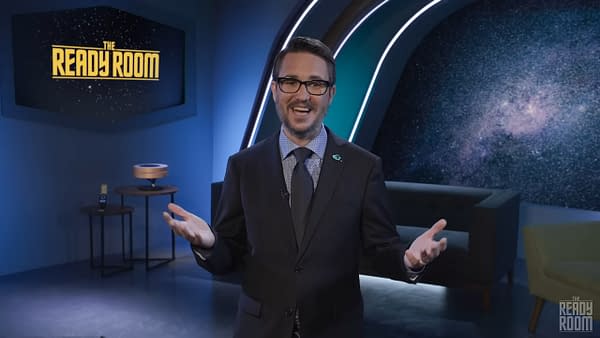
In 1960, SAG and WGA struck to force management to adapt to the new technology of television. Without that strike and the agreement it birthed, residual use payments would not exist.
My parents stole nearly all of my salary from my entire childhood. My Star Trek residuals were all I had, and they kept me afloat for two decades while I rebuilt my life. I have healthcare and a pension because of my union. The AMPTP billionaires want to take all that security away so they can give CEOs even more grotesque wealth at the expense of the people who make our industry run.
To give some sense of what is at stake: There are actors who star in massively successful, profitable, critically acclaimed shows that are all on streaming services. You see them all the time. They are famous, A-list celebrities. Nearly all of those actors don't earn enough to qualify for health insurance, because the studios forced them to accept a buyout for all their residuals (decade of reuse, at the least) that is less than I earned for one week on TNG. And I was the lowest paid cast member in 1988. They want to do this while studio profits and CEO compensation are at historic highs.
I mean, if not now, when? And I haven't even touched on AI and working conditions.
We must fight for the future of our industry in the face of changing technology, the same way our elders did in 1960. So today, my Spacemom and I went to the place where it started for us, way back when, to do just that.
I see all your support. It means so much. Thank you.
Wil Wheaton on Fans Separating Buffy from "Garbage" Joss Whedon
Back in October 2021, a fan explained in a posted question that they were big Buffy the Vampire Slayer fans since they were teenagers and how "The Body" (when Sarah Michelle Gellar's Buffy lost her mother) helped them deal with the loss of their father. But since the allegations against series creator Joss Whedon had surfaced, they "haven't rewatched a single episode." Now, they were looking to Wheaton to share his thoughts on if it's possible to love the art and hate the artist or do folks need to "box that away." Wheaton began by explaining that he had run into the same situation with a songwriter he idolizes when he was younger who "grew up to be a reprehensible bigot" before directing his thoughts to Whedon:
This is a long way of saying that Joss sure turned out to be garbage. Because of who I & my friends are, I know stuff that isn't in the public, and it's pretty horrible. He's just not a good person, and apparently never was a good person.
BUT! Buffy is more than him. It's all the actors and crew who made it. It's all the writers who aren't Joss. Joss is part of it, sure, and some of the episodes he wrote are terrific.
At least one of the episodes he wrote was deeply meaningful to you at a moment in your life when you'd experienced a loss I can only imagine. The person you are now, and the 16-year-old you were who just lost their dad, are more important than the piece of shit Joss Whedon revealed himself to be.
His bad behavior is on him. He has to live with it, and the consequences of it.
16-year-old you, who just lost their dad, shouldn't have to think about what a shit Joss Whedon is for even a second. That kid, and you, deserve to have that place to revisit when you need to go there.
From there, Wheaton explained that as an actor who is also an abuse survivor, he hopes that viewers watch & enjoy his work to show that the art is bigger than "what one piece of shit did two decades ago." As Wheaton sees it, "I believe that when some piece of art is deeply meaningful to a person, for whatever reason, that art doesn't belong to the person who created it, if it ever did. It belongs to the person who found something meaningful in the art." The choice is with the person making the decision that's best for them and respectful to the art, without the artist needing to be a factor. "If it feels right to you to put it away and never look at it again, that's totally valid. But if it brings you comfort, or joy, or healing, or just warm familiarity to bring it out and spend some time with it, that's totally valid, too," explained Wheaton:




